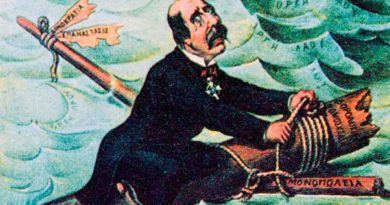World War II
Despite this declared neutrality, Greece became a target for Mussolini’s expansionist policies. Provocations against Greece included the sinking of the Greek cruiser Elli on 15 August 1940. Italian troops crossed the border on 28 October 1940, beginning the Greco-Italian War, but were stopped by a determined Greek defence that ultimately drove them back into Albania.
Metaxas died suddenly in January 1941. His death raised hopes for a liberalization of his regime and the restoration of parliamentary rule, but King George quashed these hopes when he retained the regime’s machinery in place. In the meantime, Adolf Hitler was reluctantly forced to divert German troops to rescue Mussolini from defeat, and attacked Greece through Yugoslavia and Bulgaria on 6 April 1941. Despite British assistance, the Germans overran most of the country by the end of May. The King and the government escaped to Crete, where they stayed until the end of the Battle of Crete. They then transferred to Egypt, where a Greek government in exile was established.
The occupied country of Greece was divided in three zones (German, Italian and Bulgarian) and in Athens, a puppet regime was established. The members were either conservatives or nationalists with fascist leanings. The three quisling prime ministers were Georgios Tsolakoglou, the general who had signed the armistice with the Wehrmacht, Konstantinos Logothetopoulos, and Ioannis Rallis, who took office when the German defeat was inevitable and aimed primarily at combating the left-wing Resistance movement. To this end, he created the collaborationist Security Battalions.
Greece suffered terrible privations during World War II as the Germans appropriated most of the country’s agricultural production and prevented its fishing fleets from operating. As a result, and because a British blockade initially hindered foreign relief efforts, a Great Greek Famine resulted. Hundreds of thousands of Greeks perished, especially in the winter of 1941–1942. In the mountains of the Greek mainland, in the meantime, several Greek resistance movements sprang up, and by mid-1943, the Axis forces controlled only the main towns and the connecting roads, while a “Free Greece” was set up in the mountains.
The largest resistance group, the National Liberation Front (EAM), was controlled by the Communist Party of Greece, as was the Greek People’s Liberation Army (Elas), led by Aris Velouchiotis, and a civil war soon broke out between it and non-Communist groups such as the National Republican Greek League (EDES) in those areas liberated from the Germans. The exiled government in Cairo was only intermittently in touch with the resistance movement and exercised virtually no influence in the occupied country. Part of this was due to the unpopularity of King George II in Greece itself, but despite efforts by Greek politicians, British support ensured his retention at the head of the Cairo government.
As the German defeat drew nearer, the various Greek political factions convened in Lebanon in May 1944 under British auspices and formed a government of national unity under George Papandreou, in which EAM was represented by six ministers.



